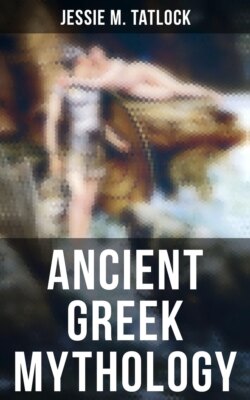Читать книгу Ancient Greek Mythology - Jessie M. Tatlock - Страница 11
На сайте Литреса книга снята с продажи.
III. HEPHÆSTUS (VULCAN)
ОглавлениеHalf-brother of Athena, and son of Zeus and Hera, was He phaes’tus, the lame god of fire, the forge and metal-work, and as such, together with his great sister, a mighty helper of men in their struggle for civilization. He is thus addressed in the Homeric Hymn:
Sing, shrill Muse, of Hephæstus, renowned in craft, who with gray-eyed Athena taught goodly works to men on earth, even to men that before were wont to dwell in caves like beasts; but now, being instructed in craft by the renowned craftsman, Hephæstus, lightly the whole year through they dwell happily in their own homes. (Homeric Hymn to Hephæstus.)
He was born lame, but two stories are told of his fall from heaven that would more than account for any such deformity. According to the one, Hera, chagrined at finding her son physically imperfect, threw him out of heaven. To avenge himself for this cruelty on his mother's part, Hephæstus cunningly constructed a golden chair and brought it as a present to Hera. When she had taken her seat upon it, invisible chains held her fast, nor could she be freed. The gods pleaded with Hephæstus in vain, until Di o ny’sus (Bacchus), the wine-god, made him drunk and so brought him to Mt. Olympus and induced him to undo his own handiwork. According to the other story Zeus, resenting his championship of his mother in one of the many quarrels between the royal pair, seized him by the foot and hurled him from Olympus.
All day I flew, and at the set of sun I fell in Lemnos, and little life was in me. (Iliad, I. 592.)
Hephæstus made the glorious palaces of the gods on Olympus; he made the scepter of Zeus and the shield of Achilles; he helped to mold Pandora. His workshops were under the earth, where volcanoes gave an outlet to the fires of his forge. Thus the Greeks saw his home in the volcanic island of Lemnos, and the Greeks of South Italy and Sicily, under Mt. Ætna or on one of the Lipari Islands. On the latter, it was the popular belief that if the metal were left over-night near the crater, and due prayer and sacrifice made to the god, a marvelously forged sword would be found in the morning. To aid him in his work he had wonderful maidens of gold. He is described in his workshop by Homer:
Fig. 13. Hephæstus and the Cyclopes preparing the shield of Achilles.
He said, and from the anvil rose limping, a huge bulk, but under him his slender legs moved nimbly. The bellows he set away from the fire, and gathered all his gear wherewith he worked into a silver chest; and with a sponge he wiped his face and hands and sturdy neck and shaggy breast, and did on his doublet, and took a stout staff and went forth limping; but there were handmaidens of gold that moved to help their lord, the semblance of living maids. In them is understanding at their hearts, in them are voice and strength, and they have the skill of the immortal gods. (Iliad, XVIII. 410 ff.)
Ever friendly and helpful, often a peacemaker, Hephæstus was beloved of men and gods, though his limping gait subjected him to ridicule.
Then he poured forth wine to all the gods, from right to left, ladling the sweet nectar from the bowl. And laughter unquenchable arose among the blessed gods to see Hephæstus bustling through the palace. (Iliad, I. 597 ff.)
Hephæstus is not a favorite subject in art, but when he appears it is as a strongly-built man, his lameness only hinted at. He is dressed in a workman's short tunic and wears the workman's cap. Probably he originally represented the lightning; hence the story of his fall from heaven.
Vulcan, the fire-god, was more feared than courted in Rome, with its close-built streets, so subject to destructive fires. His worship, therefore, as originally that of the war-god Mars, was kept outside the city.
Fig. 14. Apollo, from Olympia.
